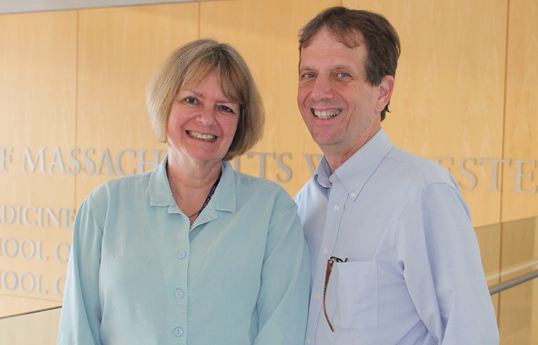
Julie Jonassen,PhD, with husband and IT specialist Richard Rabe, will launch a computerized medical learning management system in Liberia this summer.
A team of UMass Medical School faculty is headed to Liberia to help modernize the country’s only medical school by installing a computer network that will vastly improve how aspiring doctors are trained. The computerized curriculum project is a new initiative in UMass Medical School’s ongoing commitment to help rebuild Liberia’s health care system.
“It’s exciting to think about being in a place where you can do something transformational—that’s what we’re hoping to do,” said Julie Jonassen, PhD. “Our goal is to build a complete, self-contained system in Liberia, where the power goes off every day and they don’t have reliable access to the Internet.”
Dr. Jonassen, professor of microbiology & physiological systems, and her husband, IT specialist Richard Rabe, will spend three weeks at the A. M. Dogliotti School of Medicine in Monrovia, where they will set up and test what they call a self-contained “curriculum delivery system in a box.”
“A learning system is a repository of teaching materials—lectures, Powerpoint slides, quizzes—that students can interact with through an intranet in a local learning environment, without being connected to the Internet,” explained Jonassen.
A longtime member of the Educational Policy Committee at UMMS, Jonassen has extensive experience in curriculum development. Initially interested in joining colleagues in Liberia to teach its medical students, she learned through the UMMS Office of Global Health that installing a computer lab is part of the overall agenda for efforts at the University of Liberia that are funded in large part by a $2.6 million award from the U.S. Agency for International Development (USAID) through Higher Education for Development (HED). HED manages the educational partnership which includes Indiana University as well as UMMS and the University of Liberia.
“The potential for this system is being able to create all the elements for an online or blended curriculum. You could enroll your class, upload materials, deliver the exams and quizzes, manage the grades, manage the quizzes, upload lectures, videos, annotated voiceover Powerpoints,” said Jonassen. “Part of creating sustainability is making sure that we don’t just transfer the hardware, but that we transfer the knowledge about how to develop and maintain curriculum in an online, computer-based interactive environment.
That’s where Rabe came in, bringing decades of IT experience to the project. He spent months learning about the operating system Ubuntu Linux and the educational software platform MOODLE, both free open-source products that he recommended for the Liberia project based on their accessibility and ease of use. Now with another firm, Rabe was most recently at St. Gobain Abrasives in Worcester, where he received enormous support for the UMMS project.
“We want to make it sustainable—something that Liberians can maintain, taking into account things like an unstable electrical environment and no air conditioning,” Rabe noted. “We still have a few of those challenges to face when we’re there.”
While Rabe works to overcome infrastructure deficiencies, Jonassen is customizing the curricular components. “I’ve been thinking about health care and health issues in Africa versus in Worcester as I work with these materials,” she said. For example, she is reframing the module on thyroid disease because in Africa it is predominantly caused by iodine deficiency, which is practically nonexistent in the United States.
The project is a personal as well as professional mission for Jonassen and Rabe. They have been inspired by their eldest daughter’s enthusiasm for her career in global health, which has taken her to Africa several times. They also hope to extend their mission by forging connections between their home church in Belchertown and a congregation in Liberia.
Beyond its potential to transform medical teaching and learning in Liberia, the project also holds great promise for UMMS global health initiatives in other countries.
“Once we get this system working, we hope to take it to other countries,” said Katherine Luzuriaga, MD, professor of medicine and pediatrics, vice provost for clinical and translational research, associate provost of global health and principal investigator of the USAID grant. “This is an exciting story of how a UMMS-community partnership has enabled us to do so much more than we could have done with the grant alone.”
Related links on UMassMedNow:
Gilroy teaches anatomy in Liberia
UMMS faculty forge strong bonds with Liberia
Launching medical education studies in Liberia
Library projects lending order to chaos in Liberia
Medical School team rebuilding health care in Liberia